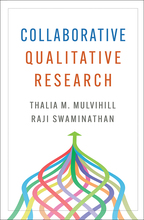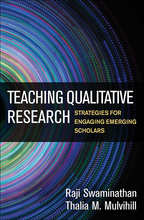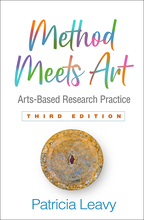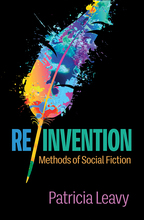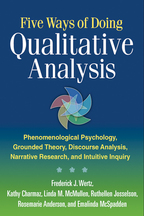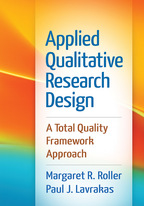Collaborative Qualitative Research
Thalia M. Mulvihill and Raji Swaminathan
HardcoverPaperbacke-bookprint + e-book
Hardcover
orderSeptember 5, 2022
ISBN 9781462550272
Price: $66.00 274 Pages
Size: 6⅛" x 9¼"
Paperback
orderAugust 26, 2022
ISBN 9781462550265
Price: $44.00274 Pages
Size: 6⅛" x 9¼"
e-book
orderAugust 2, 2022
PDF and Accessible ePub ?
Price: $44.00 274 Pages
ePub is Global Certified Accessible
print + e-book $88.00 $52.80
orderPaperback + e-Book (PDF and Accessible ePub) ?
Price: 274 Pages
ePub is Global Certified Accessible
“Clearly described strategies and resources are provided which may be utilized to navigate the inevitable choppy waters of collaborative research.”

—Educational Action Research
“Throughout their methodology discussions, Mulvihill and Swaminathan give particular care to maintaining respect for collaborators; ensuring volunteering is genuine rather than the result of coercion; and keeping in mind the legacy of colonialism and inequality in research. They thoughtfully note that collaboration is not always the best approach to research and that collaboration can sometimes be seen by participants as burdensome. Their backgrounds in international research and working with a variety of stakeholders shine through in these discussions….The authors demonstrate a strong understanding of the layers, nuances, strengths, and limitations of collaborative qualitative research, especially with collaborators diverse in power, role, and background. In every chapter, they demonstrate their belief in the power of meaningful collaboration in contrast to the more simplistic, task-division notion of cooperation….Exemplars and Pedagogical Pathways are generously sprinkled throughout each chapter….This book fills an important methodological void. Graduate students and collaborative scholars can truly benefit from reading what it has to share.”

—Teachers College Record (review by Sherry Marx, PhD)
“Finally, a book that focuses on collaborative qualitative research! I particularly appreciate the practical discussions of evaluating and analyzing collaborative studies; writing, presenting, and publishing the findings; and pedagogical issues. The 'Pedagogical Pathways' will be useful in classrooms and for newer research collaboration groups to help them navigate the process of collaboration. This book is a necessary part of every qualitative researcher's and instructor’s library.”

—Regina Garza Mitchell, EdD, Department of Educational Leadership, Research and Technology, Western Michigan University
“This is a wonderful introduction to collaborative qualitative research. Graduate students, early-career professionals, and others new to this area will find a comprehensive review of the theories, issues, and methods most relevant to a collaborative approach. Readers from a wide variety of backgrounds and disciplines will find this book accessible. Course instructors will find interesting and valuable activities to use in their classes.”

—Lori E. Koelsch, PhD, Department of Psychology, Duquesne University
“A storehouse of information and practical guidance, starting with what collaboration is and moving through thoughtful considerations of how to conduct collaborative initiatives, interdisciplinary applications, ethical issues, and future potentials. Mulvihill and Swaminathan ground the reader in arts-based and other approaches, summarize multiple views, and provide helpful exercises and reflection questions. They delve into many examples of collaborative work and go into lots of detail about crucial questions and decisions. This richly resourced and referenced book will be of critical importance to both new and more experienced collaborative researchers.”

—Dan Wulff, PhD, Faculty of Social Work (Emeritus), University of Calgary, Canada
“The authors lay out both theoretical foundations and practical applications for engaging in powerful, equitable qualitative inquiries that have the potential to transform communities. The topics are brought to life through pedagogical elements that will enable practicing researchers and graduate students to make sense of and conduct collaborative research.”

—Brian Schultz, PhD, Department of Teacher Education, Miami University
—Educational Action Research
“Throughout their methodology discussions, Mulvihill and Swaminathan give particular care to maintaining respect for collaborators; ensuring volunteering is genuine rather than the result of coercion; and keeping in mind the legacy of colonialism and inequality in research. They thoughtfully note that collaboration is not always the best approach to research and that collaboration can sometimes be seen by participants as burdensome. Their backgrounds in international research and working with a variety of stakeholders shine through in these discussions….The authors demonstrate a strong understanding of the layers, nuances, strengths, and limitations of collaborative qualitative research, especially with collaborators diverse in power, role, and background. In every chapter, they demonstrate their belief in the power of meaningful collaboration in contrast to the more simplistic, task-division notion of cooperation….Exemplars and Pedagogical Pathways are generously sprinkled throughout each chapter….This book fills an important methodological void. Graduate students and collaborative scholars can truly benefit from reading what it has to share.”
—Teachers College Record (review by Sherry Marx, PhD)
“Finally, a book that focuses on collaborative qualitative research! I particularly appreciate the practical discussions of evaluating and analyzing collaborative studies; writing, presenting, and publishing the findings; and pedagogical issues. The 'Pedagogical Pathways' will be useful in classrooms and for newer research collaboration groups to help them navigate the process of collaboration. This book is a necessary part of every qualitative researcher's and instructor’s library.”
—Regina Garza Mitchell, EdD, Department of Educational Leadership, Research and Technology, Western Michigan University
“This is a wonderful introduction to collaborative qualitative research. Graduate students, early-career professionals, and others new to this area will find a comprehensive review of the theories, issues, and methods most relevant to a collaborative approach. Readers from a wide variety of backgrounds and disciplines will find this book accessible. Course instructors will find interesting and valuable activities to use in their classes.”
—Lori E. Koelsch, PhD, Department of Psychology, Duquesne University
“A storehouse of information and practical guidance, starting with what collaboration is and moving through thoughtful considerations of how to conduct collaborative initiatives, interdisciplinary applications, ethical issues, and future potentials. Mulvihill and Swaminathan ground the reader in arts-based and other approaches, summarize multiple views, and provide helpful exercises and reflection questions. They delve into many examples of collaborative work and go into lots of detail about crucial questions and decisions. This richly resourced and referenced book will be of critical importance to both new and more experienced collaborative researchers.”
—Dan Wulff, PhD, Faculty of Social Work (Emeritus), University of Calgary, Canada
“The authors lay out both theoretical foundations and practical applications for engaging in powerful, equitable qualitative inquiries that have the potential to transform communities. The topics are brought to life through pedagogical elements that will enable practicing researchers and graduate students to make sense of and conduct collaborative research.”
—Brian Schultz, PhD, Department of Teacher Education, Miami University

